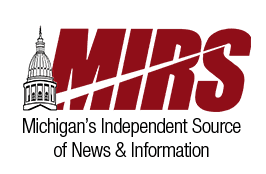(Source: MIRS.news, Published 12/20/2023) Mike Johnston, the Michigan Manufacturers Association's (MMA's) executive vice president of government affairs, knows of one change he'd like to see the state's corporate incentive program undergo. He'd prefer to see the awards further "streamlined" into companies' hands. In other words, he'd like to see individual awards moved forward without having to get the green light from legislators.
"There's an extra step where the appropriations committees have to decide, and companies have to wait to see. . . It gets too political. It gets drawn out and creates uncertainty for companies," Johnston said. "Let's eliminate the uncertainty. . . If we want the companies to come here, let's get them here."
Wednesday afternoon, the MMA hosted a policy round table with the organization's various leaders. While describing the year's successes, Johnston highlighted economic development spending – especially through Michigan's Strategic Outreach and Attraction Reserve (SOAR) Fund – in the conversation's first 20 minutes.
On Dec. 14, the SOAR Fund program – designed with an initial $1 billion to lure large-scale economic projects to Michigan – reached its two-year anniversary since being approved by the House and Senate.
According to Johnston, within those two years, $3.5 billion has been offered to corporations through the SOAR Fund, and $16 billion and 16,000 job opportunities have been directed to Michigan through planned developments.
However, in 2023, the SOAR Fund continued to be a source of debate.
For example, the planned $2.36 billion, 2,350-future job development by Gotion Inc. – a battery parts manufacturer expecting to build in Mecosta County – became embroiled in controversy over allegations that the SOAR program wasn't considering national security threats, as well as claims that it was ignoring opposition from local residents.
In this year's November municipal elections, voters in Green Township – the planned site for the Gotion development – successfully voted to recall the entire township board for their support for the battery-material manufacturing plants.
The project was incentivized with a $125 million Critical Industry Program (CIP) award from the SOAR Fund to directly assist the company with building four plants for producing cathode and anode battery materials.
Additionally, $50 million was distributed from the fund to be a Strategic Site Readiness Program (SSRP) award, assigned to the Right Place Inc. – a greater Grand Rapids economic development organization – for financing infrastructure upgrades backing Gotion.
The SOAR fund transfers were approved in the House and Senate appropriations committees, which is required for the Michigan Economic Development Corporation (MEDC) to start releasing awards to companies – the procedure Johnston linked to creating uncertainty for businesses looking to develop in the state.
But both before and after the committees' approval, Gotion was criticized for having a Chinese parent company, with July 2022 Articles of Association reading "the Company shall set up a Party organization and carry out Party activities in accordance with the Constitution of the Communist Party of China."
When asked about national security concerns surrounding the SOAR Fund, Johnston said "Look, this is a global economy. The world is very complex."
"We have foreign-owned companies all over Michigan, all over the U.S. . . . It's not the state's role to decide national security. There's a federal government that has a role there. If the federal government doesn't say 'that's a security risk,' why should Michigan care? We don't have the infrastructure or capacity to do all that research," Johnston said. "It's an interesting discussion, but we're interested in growth here. If we don't bring jobs and families and careers here, they will go somewhere else."
He said Michigan's due diligence process features lots of accountability, "and frankly, there are times when there's too much accountability."
In 2024, the Legislature could be moving further on legislation that would re-brand the SOAR Fund as the "Make It in Michigan Fund." The renamed corporate incentive fund – established under SB 559, SB 560, SB 561, SB 562 and SB 569 – would include a new "Michigan 360 Program" for grants dedicated to improving a community's quality of life where a development is sited, such as through financing fresh housing and childcare centers.
Eligible recipients would consist of local universities or community colleges, community advocacy groups or counties, cities, townships and villages themselves.
Under the bills, 20% of total SOAR-related incentives to a corporation must be presented as "Michigan 360 Program" awards. A Nov. 30-Dec. 1 survey commissioned by Progress Michigan found that 68% of voters supported – either somewhat or strongly – that kind of proposal.
"We've been in this awkward position of saying to the Democratic majority, particularly in the Senate, 'you know what, your approach isn't competitive,'" Johnston said when asked about the proposed changes. "Housing and infrastructure…all good stuff, but if you can't be competitive with other states, that company – those jobs – are going to go somewhere else, and it doesn't matter whether you have housing, childcare, infrastructure…because there are no families coming here. People follow jobs."
As for the latest issue of Ford Motor Company announcing in November that it's planned battery park in Marshall will generate 1,700 jobs – instead of the expected 2,500 jobs that were promoted when Ford was being awarded more than $330 million from the SOAR Fund – Johnston said: "They don't get those dollars, unless they deliver on those jobs."
"There's this leap that 'we've given them the money, and we'll never get it back.' It's not true. It's not true. It's tied to performance," he said.

